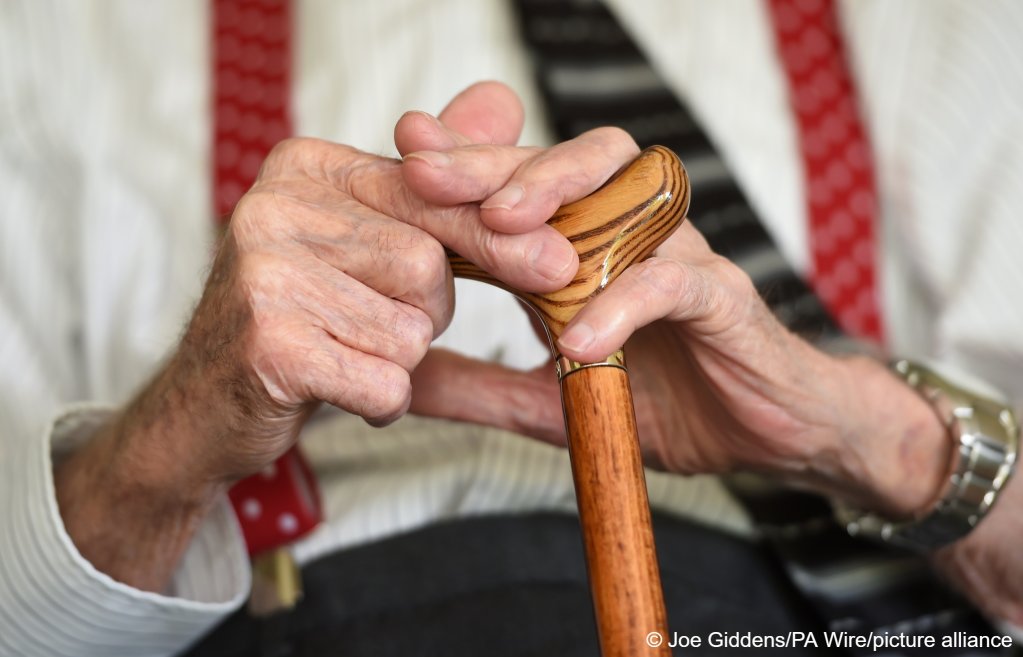In 2020, amidst a gaping shortage in healthcare workers that was poised to only worsen under Brexit, the UK launched the Health and Care Worker Visa to attract more foreign workers. The visa regime has been riddled with reports of unfair labor practices such as the one shared by Kate, a nurse from the Philippines.
When Kate* applied for a nursing position in the United Kingdom, she did not expect her life to change in a matter of weeks.
Kate submitted her application and received a job offer within seven days. Within a month, her papers and visa were processed. "Securing a flight took the longest. That took about two months."
"I'd scroll through social media and see many of my other colleagues and friends in the UK working as nurses, and I thought to myself, 'How did they get there so fast?'. Maybe I can give the UK a shot, too." Kate told InfoMigrants.
Kate, like many Filipino nurses, dreamed of working in the US, where annual salaries can reportedly be as high as 93,000 US dollars (about 81,000 euros). However, with US work permits taking about two to three years to process, the UK emerged as a more attractive launch pad where Kate could make some decent money, save up a bit, and get some experience -- before trekking the job trail in the US.

In August 2022, over a span of just three months, Kate went from basking in her dream to actually living it, working as a healthcare assistant in a private hospital just outside of London.
"It was a good place for me to start, I think. Everything happened so fast that I was overwhelmed. I didn’t have time to prepare to live and move to a new country. The town where I was first based was perfect for the adjustment phase. There were many Asians and Filipinos. It looked and felt like Asia but with European-looking buildings," recalled Kate.
Read AlsoUK: Increasing reliance on migrant workforce
Fast-track hiring of healthcare workers
Kate was hired as a skilled worker under the UK Health and Care Worker visa, a fast-track program launched in 2020 to plug staffing shortages in the healthcare and social work sectors. At the time of its rollout, the scheme promised perks such as a pathway to permanent residency and an option to bring in family members.
Initially, everything seemed like a smooth transition for Kate. The workload was actually lighter than back home, and Kate was making a good salary. But life took another quick turn when Kate got into an accident in November 2022.
"I nearly died," said the 29-year-old.
Despite not being fully recovered -- and with visible injuries -- financial pressure forced her to go back to work after a week.
Caught up in the compounded stress of recovery and the holiday revelry, Kate missed the December 31 deadline to renew her nursing registration by just a few days.
Kate paid the renewal fee immediately and informed her supervisor. According to Kate, she was still allowed to scrub in on an operation because there was a shortage of staff on duty. Soon after, she was called and told she was suspended without pay for working with an "inactive license."
Kate was instructed to leave the premises immediately and was escorted out. She was told that she was prohibited from contacting colleagues and from being on the hospital premises. "I felt like I had committed some kind of crime."
Kate stressed to InfoMigrants, "My license wasn’t suspended. It was inactive pending payment of the renewal fee. However, the crediting of the payment overlapped with a bank holiday.''
After her suspension, an internal committee ruled that Kate be terminated for "gross misconduct."
Not having an employer meant that Kate no longer had a visa sponsor. Under the Health and Care Worker visa, a worker must find a new sponsor within 60 days of job loss or face deportation.
"Sixty days isn’t really a lot of time when you include weekends and all that needs to be done. You don't need just a job offer -- you need a visa sponsor and the time to process these papers," Kate explained.
Earlier, this month, the UK government rolled out new regulation requiring employers to hire health care workers that are already in the UK, which includes those already in the country but may have lost their job. The move is reportedly meant to ease the burden of the ticking 60-day period to find a new job and visa sponsor.
Al Aure of the labor rights group Migrante UK told InfoMigrants that the new regulation has good intentions. ''On paper, it will help those who lost their jobs and they will be absorbed back into the workforce. However, problems persist.''
Aure pointed to workplace issues such as burnout from workload due to chronic staff shortages and absences. Such issues, combined with the low pay of about 13 to 14 pounds (about 15 to 16 euros) per hour, make working in healthcare less attractive. ''Some people would rather work in a cafe or in a retail shop which pays about 12 pounds (14 euros) per hour but with less stress and responsibility.''
Beating a 60-day deadline
There were other factors that were making the 60-day deadline difficult for Kate. For one, her employment record now included a "gross misconduct" mark, making new employers wary. Additionally, by that time, the UK raised the minimum salary threshold for visa sponsorship from 24,000 pounds (28,000 euros) to 38,700 pounds (45,000 euros) — a move that critics say makes it even harder for migrant healthcare workers to find an employer.
Migrant worker rights activists say that Health and Care Worker visa, borne out of the desperate need to hire workers amidst a crippling healthcare worker shortage and the impact of Brexit has given rise to a pockmarked visa regime that has left migrant health care workers vulnerable to exploitation.
Speaking to InfoMigrants last June, Rumbidzai Bvunzawabaya, a solicitor for over 20 years who now works with many migrant care workers and the companies that employ them, estimated that about 34,000 companies came rushing in to register themselves and sponsor healthcare workers, many with no track record in the sector. Certificates of sponsorship were reportedly faked, and company websites were cloned. According to Bvunzawabaya, some workers were reportedly falsely recruited in the name of legitimate companies whose names had been used by scammers and middlemen who pocketed the recruitment fees.
A report by The Bureau of Investigative Journalism (TBIJ) last year revealed that, partly in response to this, the government revoked the licenses of 122 companies in 2022 and 2023, resulting in nearly 3,000 care workers having their sponsorship canceled.
Kate's connections in the vast Filipino community helped her beat the 60-day deadline. "Even or maybe especially in a foreign country, it is fellow Filipinos that will help you," said Kate, who now works in a clinical setting.
Kate is now preparing to file a case against her former employer for what she claims was unjust termination and racial discrimination. "It wasn’t just me. Other nurses also missed renewals of their licenses. The hospital's human resource department is supposed to keep an eye out for those dates -- which they didn't do in my case. I feel they used me as a scapegoat to cover up their lapses."
Read AlsoUK: 'Sold a pipe dream?' How thousands of care workers risk deportation after paying for visas
'Who wouldn’t want to leave?'
The Philippines is the leading supply of nurses and healthcare workers, staffing an estimated 25 percent of all overseas nurses worldwide10 and 83 percent of foreign nurses in the US. Kate is one of thousands of Filipino nurses who have left the Philippines in recent years in search of better pay and working conditions.
Despite loving her job, Kate struggled in the Philippines, where the workload was backbreaking and the salary pitiful. In the three years that she had worked as a nurse, Kate had experienced being the sole nurse overseeing a recovery room of about 10-12 patients and once, being in charge of an entire ward with about 60 patients. These are regular working conditions for nurses who can, at most, earn about 32,000 Philippine pesos (498 euros) a month working at a private hospital.

"Who wouldn’t want to leave?" asked Kate.
As a migrant healthcare worker, Kate understands the compounded vulnerability of being a guest worker navigating a system that was built for foreign recruitment and hiring, but not sufficiently designed to support them when problems arise.
"I'm grateful to still have a job and live my dream of working abroad, for sure. But I also hope that there will be better protections for workers like me."
*Name has been changed at the respondent’s request for privacy
